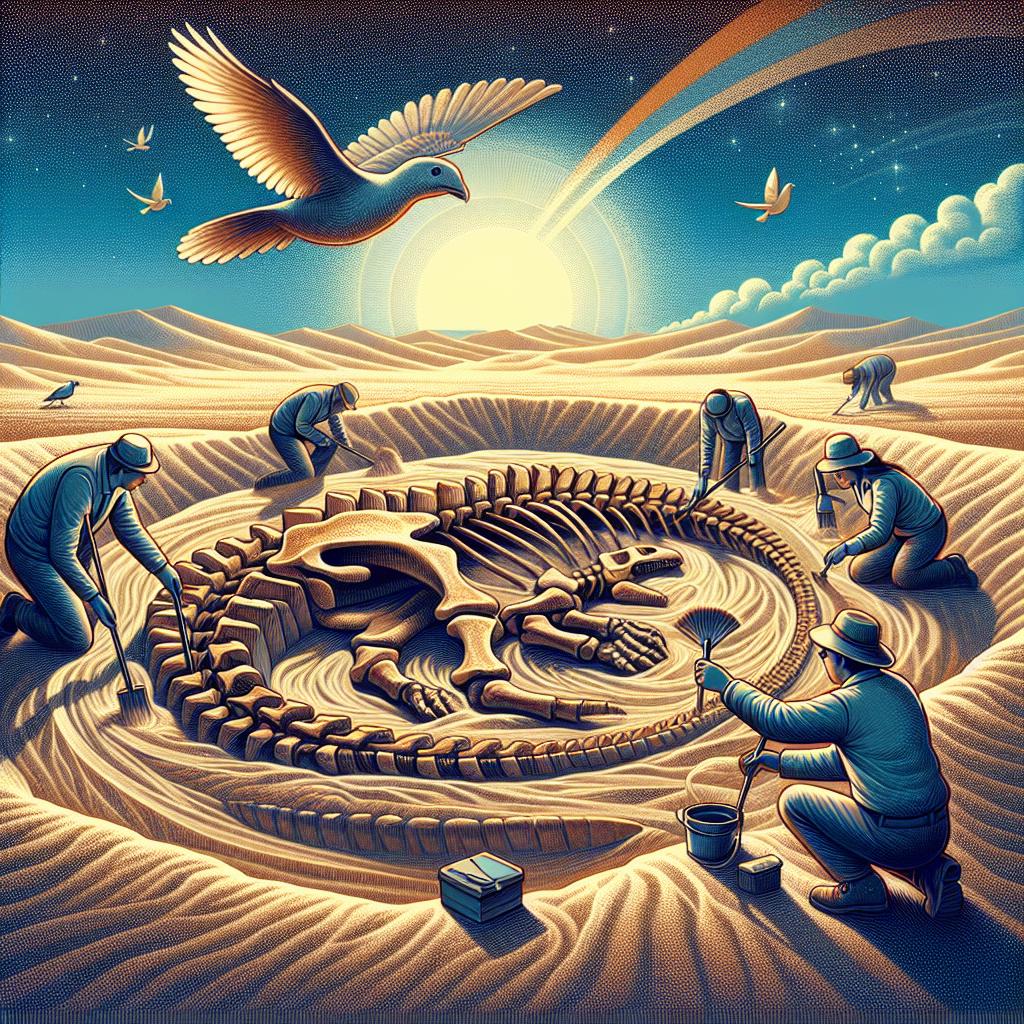
Faith-Filled Dinosaur Q&A: Unveiling God's Wonders
Published: 28 April 2024
Dinosaur Questions and Answers
Dinosaurs have always fascinated us, and their existence raises intriguing questions about the world's history. As Christians, we approach the study of dinosaurs with a staunchly conservative, biblical perspective. In this article, we will explore eight key questions about dinosaurs, providing biblically-grounded answers that align with the truths of Scripture.
1. What were dinosaurs?
Dinosaurs were a group of reptiles that lived millions of years ago. They varied greatly in size, from small bird-like dinosaurs to massive creatures like Tyrannosaurus rex. Fossils are the primary evidence we have to study these ancient creatures. Fossilization occurs when the remains of an organism are preserved in sediment over time, eventually turning into rock.
According to the biblical perspective, dinosaurs were part of God's creation during the sixth day of creation (Genesis 1:24-25). They existed alongside other animals and were designed by God to fulfill their unique roles in the ecosystem.
2. How do we know dinosaurs existed?
The existence of dinosaurs is well-documented through fossil evidence. Fossils provide a record of past life on Earth, and dinosaur fossils have been discovered all over the world. These fossils include bones, teeth, footprints, and even preserved soft tissues.
Furthermore, ancient artwork and historical accounts from different cultures around the world depict creatures resembling dinosaurs. This widespread evidence supports the conclusion that dinosaurs were real creatures that once roamed the Earth.
3. Did humans and dinosaurs coexist?
Based on a literal reading of the Bible, it is reasonable to believe that humans and dinosaurs coexisted at some point in history. While it is challenging to pinpoint specific interactions between humans and dinosaurs, there are indications in Scripture that suggest their coexistence.
For example, in Job 40:15-24, God describes an enormous creature called "Behemoth" that many scholars believe to be a reference to a sauropod dinosaur. This passage implies that Job, an ancient figure, would have been familiar with such creatures. Additionally, there are cave paintings and ancient carvings that depict humans alongside dinosaur-like creatures, providing further support for the idea of coexistence.
4. How do dinosaurs fit into the biblical timeline?
The Bible provides a general timeline of history, but it does not give specific dates for events or the duration of periods. Therefore, it is challenging to determine precisely when dinosaurs lived in relation to other biblical events.
However, based on the genealogies and historical accounts in Scripture, it is reasonable to conclude that dinosaurs lived before the global flood described in Genesis. This catastrophic event would have dramatically altered Earth's ecosystems and likely led to the extinction of many species, including some dinosaurs.
5. What caused the extinction of dinosaurs?
The extinction of dinosaurs remains a topic of scientific debate. While there are various theories, the biblical perspective suggests that the global flood played a significant role in their demise.
During the flood, which was a judgment from God due to human sinfulness, catastrophic changes occurred on Earth. These changes included massive flooding, upheavals in the earth's crust, and alterations in climate and ecosystems. Such environmental upheavals likely had a severe impact on many species, leading to their extinction, including certain dinosaurs.
6. How does the existence of dinosaurs align with the biblical account of creation?
The existence of dinosaurs aligns perfectly with the biblical account of creation. In Genesis 1:24-25, God created land-dwelling creatures on the sixth day, which would include dinosaurs. The Bible describes God's creative acts as intentional and purposeful, and dinosaurs were part of His plan for Earth's ecosystem.
The existence of dinosaurs also highlights the incredible diversity and creativity displayed by God in His creation. It reminds us of His power and wisdom in designing and sustaining the world.
7. What can we learn from dinosaurs?
Studying dinosaurs can provide us with valuable insights into God's creation. By examining their anatomy, behavior, and ecological role, we can gain a deeper understanding of the complexity and diversity of life on Earth.
Dinosaurs also remind us of the importance of stewardship. God entrusted humans with the responsibility to care for and manage His creation (Genesis 1:26-28). Understanding dinosaurs and their role in the past helps us appreciate the significance of preserving biodiversity and taking care of the environment today.
8. How can we apply our understanding of dinosaurs to our faith?
Our understanding of dinosaurs should ultimately deepen our faith and awe in God's creative power. As Christians, we believe that God is the Creator of all things, including dinosaurs. Their existence testifies to His wisdom, beauty, and intricate design.
Furthermore, dinosaurs remind us that God's Word is trustworthy and reliable. The Bible provides a solid foundation for understanding our world's history, including the existence of dinosaurs. As we study the evidence and align it with Scripture, our faith is strengthened, and we can confidently share our beliefs with others.
In conclusion, exploring the topic of dinosaurs from a conservative, biblical perspective allows us to marvel at God's creative work. Dinosaurs were real creatures that coexisted with humans at some point in history. Their existence aligns with the biblical account of creation, and their extinction likely occurred during the global flood described in Genesis. Studying dinosaurs can deepen our understanding of God's creation, remind us of our responsibility as stewards, and strengthen our faith in His Word.
